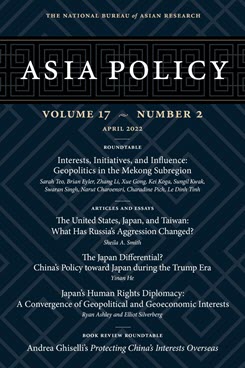Japan’s Human Rights Diplomacy
A Convergence of Geopolitical and Geoeconomic Interests
This article argues that Japan’s human rights diplomacy has undergone four distinct stages in the postwar period and analyzes Tokyo’s efforts in case studies focusing on the Middle East, Southeast Asia, and China.
EXECUTIVE SUMMARY
MAIN ARGUMENT
For decades after its defeat in World War II, Japan was perceived as a laggard in promoting human rights internationally. Today, Japan advances human rights on the global stage through a combination of peacekeeping missions, developmental assistance, and other technical investments in human security. However, Tokyo notably refrains from involving itself in certain conflicts where an unambiguous stance would interrupt meaningful business or investment ties. Japan’s gradual but significant shift regarding the use of human rights as a tool of diplomacy reflects the close links of the ruling Liberal Democratic Party to domestic commercial interests. As a result of these links, the Japanese government increasingly understands its foreign policy aims through a primarily geoeconomic lens.
POLICY IMPLICATIONS
- Focus on global human rights standards instead of individual cases. Past interactions with Japan demonstrate that underscoring the larger economic and political benefits of a more robust global human rights regime, as well as the isolating effects of not upholding international standards and responsibilities, can be an effective diplomatic approach. Such methods have been a good motivator for sparking pivotal shifts in Japanese behavior.
- Embrace business-sector leadership on human rights promotion. Japan is on a positive trajectory toward embracing human rights diplomacy primarily because of the changing priorities of large companies and industry groups. Thus, addressing human rights through these domestic commercial avenues and encouraging business-to-business dialogue represent perhaps the best hope for concrete and meaningful engagement.
- Welcome and co-sign Japanese leadership whenever evident. Japan has displayed a newfound sense of “skin in the game” from its recent leadership in high-standard multilateral trade facilitation. Simultaneously, Japan has continued to distinguish itself as an international proponent of good governance frameworks. Japan’s success in socializing its “free and open Indo-Pacific” vision should be used to incentivize Tokyo’s further involvement in devising new means of holding China and other rising powers accountable to international governance standards.
Ryan Ashley is an Intelligence Officer in the United States Air Force and an Adjunct Lecturer with the Air Force Special Operations School (United States), where he teaches courses on Japanese politics, culture, and security. Mr. Ashley has previously published on Asia-Pacific security issues with War on the Rocks, the Diplomat, and Military Times. He is also a PhD Student at the Lyndon B. Johnson School of Public Affairs at the University of Texas, focusing on Southeast Asian security relations with Japan.
Elliot Silverberg is an analyst of Indo-Pacific geopolitics based in Washington, D.C. (United States). He has conducted research as a fellow at Georgetown University’s Institute for the Study of Diplomacy and as a nonresident James Kelly fellow at the Pacific Forum in Hawaii. His work has been published in Foreign Policy, War on the Rocks, and the Japan Times, among other media outlets.
About Asia Policy
Asia Policy is a peer-reviewed scholarly journal presenting policy-relevant academic research on the Asia-Pacific that draws clear and concise conclusions useful to today’s policymakers. Asia Policy is published quarterly in January, April, July, and October and accepts submissions on a rolling basis. Learn more


